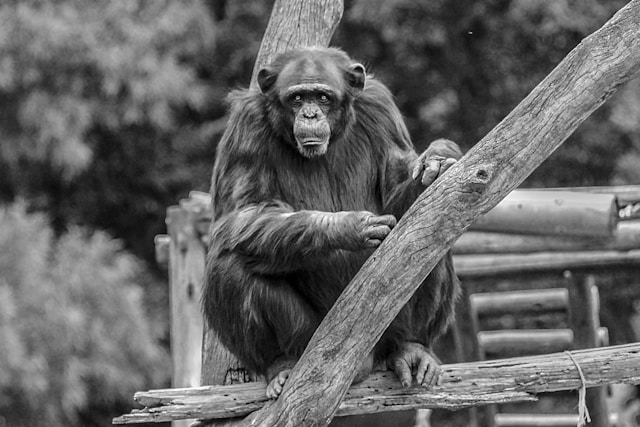The abduction and killing of an eight-month-old girl by a highly intelligent chimpanzee has led to community anger towards conservation researchers in Bosseu.
In a shocking incident that has sent ripples of outrage through the local community, Jeje, a world-famous chimpanzee known for its advanced tool use, killed an eight-month-old baby in Bosseu, Guinea. The tragedy unfolded when Jeje allegedly abducted the child from a nearby field while her mother was working, leading to the discovery of the mutilated body three kilometres from the Nimba Mountains Nature Reserve.
Witnesses reported that the child had been eviscerated, raising concerns that the chimpanzee may have used its tools to inflict the fatal injuries. Gen Yamakoshi, a chimpanzee expert, noted that such behaviour, while tragic, is not entirely unexpected. “The chimps in the region no longer fear humans,” he explained, emphasizing that excitement among the animals could lead to uncontrollable behaviour similar to how they interact with each other.
In the wake of the incident, an angry mob directed its fury toward the Bossou Environmental Research Institute, which has been studying the local chimpanzee population for decades. Locals brought the child’s corpse to the institute’s doors, ransacking the facility and destroying equipment, including drones and computers, as they expressed their anger over the horrific nature of the attack. Joseph Doré, a young member of the community, articulated the sentiment: “It’s the way she was killed that’s what angered the population.”
The chimpanzees of Bosseu, recognized for their intelligence and tool proficiency, have been subjects of research due to their remarkable use of stone hammers and anvils to crack open nuts. However, this prolonged interaction with humans has led to increased familiarity, resulting in more frequent trips into built-up areas in search of food. This change in behavior has raised the risk of violent encounters.
Moussa Koya, a youth leader at the reserve, pointed out that the chimpanzees did not intend to be violent but that the habit had formed due to their changing environment. The research centre has reported six chimpanzee attacks on humans within the reserve just this year, indicating a troubling trend.
The attack on the baby has further strained relations between the community and the researchers. A plan to create a green corridor connecting the Bossou chimps with other populations has displaced farmers, exacerbating the situation by leaving both animals and humans short of food. As tensions rise, Yamakoshi expressed a desire to mend relationships with the local people during an upcoming visit to Bosseu, acknowledging the long-term implications of the situation. “We perhaps should have thought more about the possibilities and risks of habituation 20 years ago,” he stated.
Jeje believed to be 27 years old and part of a population that has been isolated due to their geographical and genetic characteristics, is now at the centre of a tragic narrative that highlights the challenges of human-wildlife coexistence and the ethical dilemmas faced by researchers studying such intelligent species.
Analysis
Political Perspective
This tragic incident underscores the urgent need for policies that balance wildlife conservation with community safety. As human encroachment continues to impact natural habitats, the government must prioritize sustainable land management practices that consider both wildlife and human needs. Building collaborative frameworks between researchers and local communities could mitigate conflicts and enhance conservation efforts.
Social Perspective
The attack has ignited significant social unrest within the community, reflecting deep-seated frustrations regarding the management of local wildlife. The incident highlights the challenges faced by communities living near wildlife reserves, where interactions with animals can lead to tragic outcomes. Social cohesion may be tested as residents seek accountability from researchers and demand a reevaluation of conservation strategies.
Racial Perspective
This incident reflects broader issues of equity and justice in wildlife conservation, particularly in regions where local communities bear the brunt of conflicts with wildlife. The narratives surrounding human-wildlife interactions must consider the cultural and historical contexts of the communities affected, ensuring that their voices are heard in conservation discussions. Building trust between researchers and local populations is essential to create inclusive conservation frameworks.
Gender Perspective
The focus on the mother of the abducted child highlights the gendered aspects of human-wildlife conflict. Women often bear the responsibility for caring for children and managing household duties, making them particularly vulnerable in situations where wildlife encroaches on human settlements. This incident calls for a gender-sensitive approach in conservation initiatives, ensuring that women are included in decision-making processes and community resilience strategies.
Economic Perspective
The incident could have long-term economic implications for the region, particularly in terms of eco-tourism and conservation funding. If local communities feel threatened by wildlife and disillusioned with conservation efforts, it may undermine support for initiatives that contribute to the local economy. Addressing the underlying tensions and fostering cooperative relationships between researchers and villagers is crucial to sustaining economic opportunities tied to wildlife conservation.
Overall, the killing of the baby by Jeje the chimpanzee serves as a stark reminder of the complexities inherent in wildlife conservation. It raises critical questions about how to manage the balance between protecting wildlife and ensuring the safety of local communities. Engaging in meaningful dialogue and collaboration will be essential to prevent such tragic incidents in the future.
